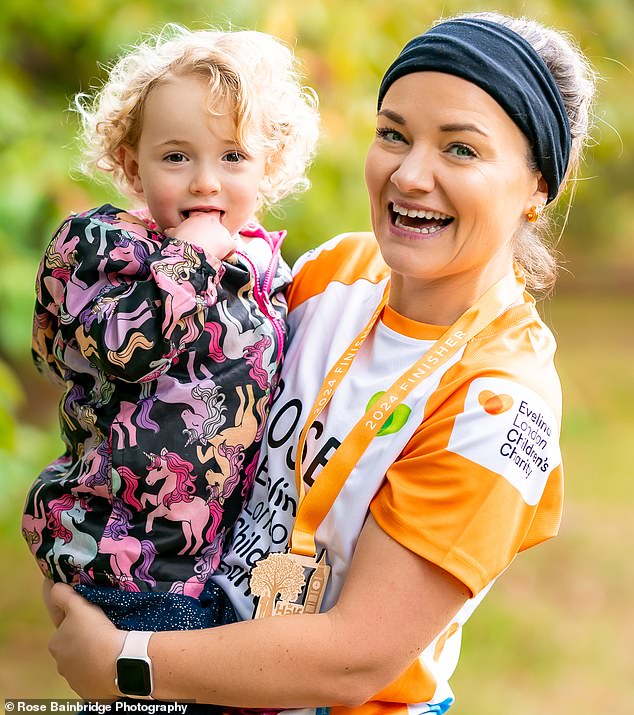Charging around the playground, blonde curls bobbing, it is hard to believe that three-year-old Molly Young has been ill for even one day in her life. But just weeks after her birth, she was on the brink of death.
Born two months early and underweight in September 2021, she caught a virus soon after arriving home and, when her parents realised she was struggling to breathe, was rushed back to hospital in an ambulance.
Doctors diagnosed her with pneumonia and, even more worryingly, life-threatening sepsis – which occurs when the body overreacts to an infection and damages tissues and organs.
Scans revealed her lungs were swollen and filled with fluid, meaning she was in danger of suffocating. She was placed on a ventilator – but this had little effect.

Molly with her mother Rose after completing a run for Evelina London Children’s Charity

Baby Molly in hospital fighting sepsis and pneumonia

Molly cheers on her mum and waves a little flag of support for ELCH
Critically ill, she was transferred to the specialist Evelina London Children’s Hospital, where doctors proposed a radical intervention.
Molly’s parents, Rose Abbott and Sam Young, from Walthamstow, east London, were told she would need a procedure called extracorporeal membrane oxygenation (ECMO), which allows the body to breathe without using the lungs.
It involves removing blood from the body, taking out the carbon dioxide and adding fresh oxygen, then returning it to the body.
This ensures that the organs continue to function. However, while effective in adults, the procedure is risky for children, as it can cause strokes and other complications.
The chances of these occurring are greatest in newborns, because their blood vessels are small and easily damaged.
But the Evelina Hospital has pioneered a new approach to ECMO for children.
Ordinarily, in children, the blood is taken and returned through the neck. However, experts say this increases the risk of blood clots travelling to the brain, leading to strokes. Instead, specialists at Evelina proposed returning the oxygenated blood through the leg.
With no other options, Rose and Sam consented, but feared Molly would never wake up.
‘We were devastated,’ says Rose, 39, a brand manager for a cosmetics firm. ‘I knew if this didn’t work, we would lose her, because it was the only option left.’
Molly was on ECMO for 12 days, which bought the doctors enough time to give her strong antibiotics and steroids to fight the lung infection and control the sepsis. And while Molly’s leg swelled as a result of the catheter placed in her groin, she did not suffer any dangerous side effects.
Her condition improved rapidly and, after being placed on a ventilator for two more days, she was breathing freely. She was discharged after three months.
‘Molly was incredibly sick and we needed to give her lungs a rest and a chance to heal,’ explains Dr Jon Lillie, Evelina’s consultant in paediatric intensive care.
‘She was the sickest patient in the hospital before we put her on the ECMO, but after that she improved so rapidly.’
Evelina now teaches its technique to other children’s hospitals.
Every year about 50,000 children in England are admitted to hospital with pneumonia, with about 1,000 deaths. Some 25,000 children are diagnosed with sepsis.
‘This approach is starting to be used more widely for small children,’ says Dr Lillie. ‘While all forms of ECMO have risks, since we began this new approach we haven’t seen any strokes.’
Rose and Sam, who also have a five-year-old son, Hughie, say Molly’s recovery is remarkable.
‘The first time we held her again was amazing,’ says Rose. ‘You take it for granted when you have a baby that you can cuddle them, but I didn’t hold her for over a month due to all the wires and tubes.
‘To hold her for an hour or so each day, that just meant the world.’
Molly now bursts with energy, says Rose. ‘We feel like a miracle was performed for us,’ she adds. ‘Molly’s just lovely, so funny, she runs everywhere and can’t wait to be outside. She has this absolute fire inside her – this incredible spirit.’
This article was originally published by a www.dailymail.co.uk . Read the Original article here. .

